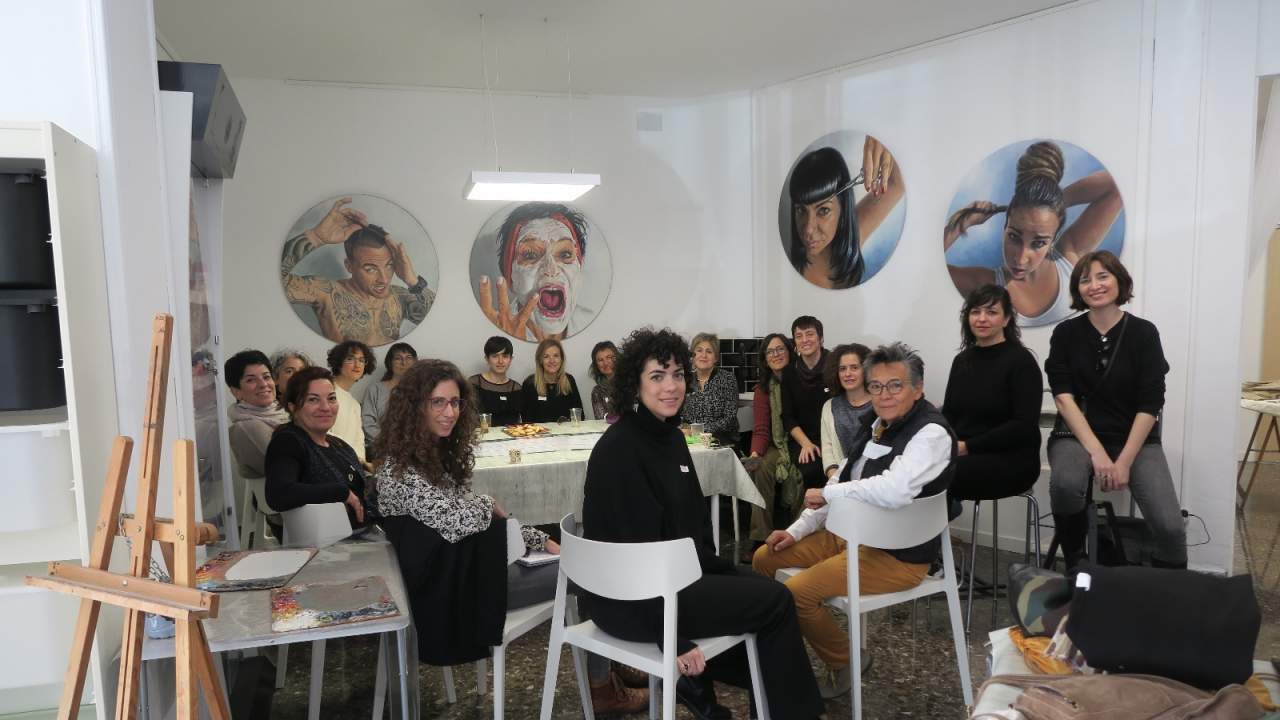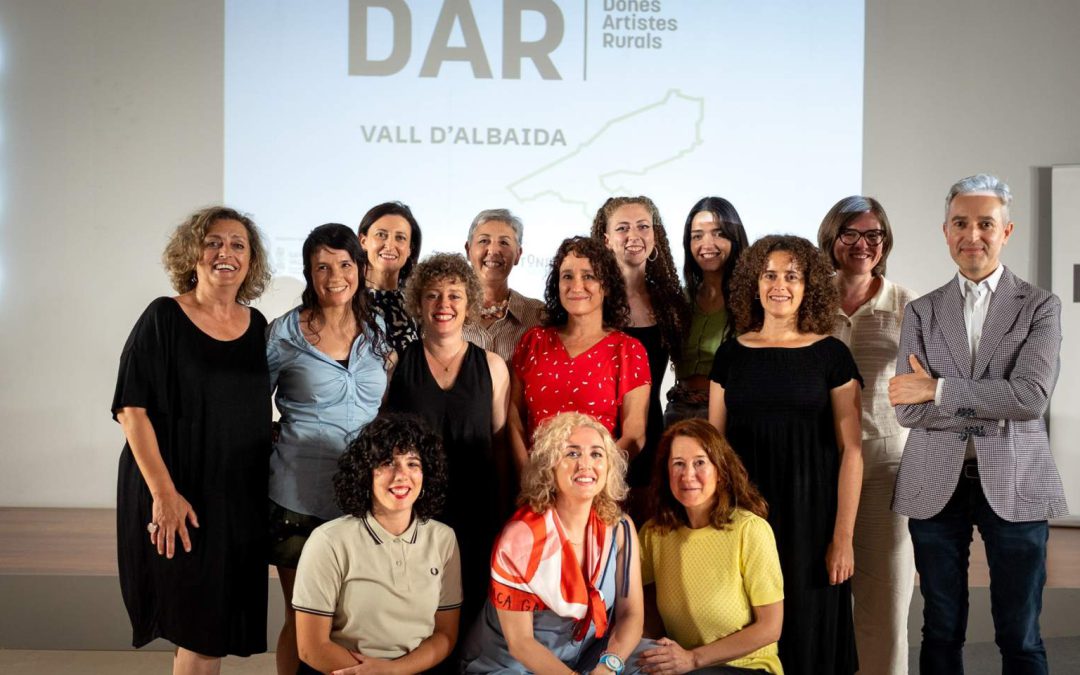Dones Artistes Rurals’ was born in 2020 and since then it has welcomed more than 50 women visual artists. On 28 August it will open the call for its fifth edition, which will be in the region of Els Ports (Castellón).
After an analysis of the reality experienced by rural women visual artists, in 2020 Clara Albacete decided to launch a personal initiative through which she could offer training for the professionalisation of female artists living in rural areas, disseminate their work and establish networks of collaboration between them. Thus was born the DAR Project, Dones Artistes Rurals, in the Valencian Community, through which more than 50 artists have already passed.
“In the faculties they teach you the creative part, but they don’t teach you how to manage your own work”, explains Albacete. With the aim of combating the shortcomings observed, the director of the DAR Project presented her initiative to a call from the Consorci de Museus de la Comunitat Valenciana and, together with other projects, it began to operate in January 2021. The first edition was carried out in the Mancomunidad de la Serranía, in the province of Valencia, and “such was the success that the Consorci decided to contract us directly to carry out two more editions”. Thus, the second edition took place in January 2022 in the Mancomunitat de l’Alcoià i el Comtat, in the province of Alicante, and the third was in September of the same year in the Mancomunitat del Alto Palencia, in Castellón.
What does the DAR Project offer?
“We move around three main axes: training for the professionalisation of rural women artists; the dissemination of their works to promote them and give them visibility; and the creation and promotion of collaborative and communication networks,” says Albacete.
The training sessions include a diagnosis of the situation of the artists’ environment through SWOT and CAME reports, “we map the cultural resources of their territories, we work on artistic discourse because it is very important to use the right terminology, we teach how to draw up documents, how to price their works, how to conserve them, how to create a portfolio or a biography, and we promote associationism”, among other training, such as what collaborative art is, what a preliminary project is, etc. They also have a professional orientation course for visual artists by Jaime López, from the Asociación Arte Sostenible.
At the end of the training programme, there is a public presentation at the Centre del Carme Cultura Contemporània where the artists have the opportunity to present their work. “When the edition ends, we continue to offer them the consultancy service, we hold quarterly meetings that we set up as networking days or we invite them to some specific training sessions”, says Clara.

As for dissemination, another important pillar of DAR, it is carried out through the project’s own website, they are promoted on social networks and in the media “and we have even managed to get the Consortium to participate in this dissemination and promote them on their social networks”.
On the other hand, the promoter of DAR also considers the creation of collaborative networks between the artists to be fundamental: “we try to generate this associative fabric between them and, in fact, in all the editions they have formed their own association. We have managed to bring them together and to ensure that they continue to develop their projects on their own”.
The call for applications for the fifth edition will open on 28 August.
The good reception and the magnificent results of last year’s editions led the Consorci de Museus de la Comunitat Valenciana to contract directly to carry out another two editions in 2023: one that took place in March in the Mancomunidad de La Vall d’Albaida, in the province of Valencia, and another that will take place in September in the Mancomunidad de Els Ports, in Castellón, and for which the DAR Project will open its call for applications on 28 August.
DAR Project in Catalonia
The artist and director of DAR explains that “in the case of Catalonia it is different” because here they have been financed with European Next Generation funds and with a grant from the Tarragona Provincial Council. They have managed to set up a first edition in February 2023 in Conca de Barberà, in Tarragona, and a second edition in March of the same year in Terres de l’Ebre, in the same province, where the final presentations of the projects were held at the Centre Cultural Fariñera and at the Museu de la Vida Rural.

Tectónica Cultural
In order to give a legal umbrella to the project ‘Dones Artistes Rurals’, Clara Albacete promotes in 2022 the non-profit association Tectónica Cultural, of which she is president and in which she has a team of art and culture professionals committed to the personal and professional development of cultural agents.
“We promote cultural diversity and social participation; we are committed to equal opportunities and we promote culture as an engine for development. For this reason, we intervene in the generation of projects that involve the promotion of cultural agents who are not visible, because visibility matters”, says Albacete.
This association is also involved in other projects such as ‘AVER: Artistas Visuales en Entorno Rurales‘, created by the Ministry of Culture and Sport and Tectónica Cultural on the occasion of the VI Foro Cultura y Ruralidades, which was held in Cuenca from 4 to 7 July 2023.
The future of the DAR Project
At present, according to the director of DAR, they are trying to renew the contract with the Consorci de Museus de la Comunitat Valenciana; in Catalonia they want public institutions to get involved and, in turn, they are in dialogue with other autonomous communities to try to reach rural women in other territories.
“For me, this project brings me a lot because it is worthwhile because it helps those women who want to make a living from art in their villages. It is not easy, but it is possible with the right tools and constant work”. Clara says that she sees how they set up their own businesses, how their sales increase, how they win prizes and how they overcome the idea of belittling themselves, of “I don’t think I’m good enough”. In short, “many opportunities and possibilities are opening up for them”.
Lázaro, H. (2023). Proyecto DAR: Formación de mujeres artistas visuales, difusión de su obra y creación de redes colaborativas. Pueblo. El periódico de la España Rural. https://periodicopueblos.com/art/1209/proyecto-dar-formacion-de-mujeres-artistas-visuales-difusion-de-su-obra-y-creacion-de-redes-colaborativas






